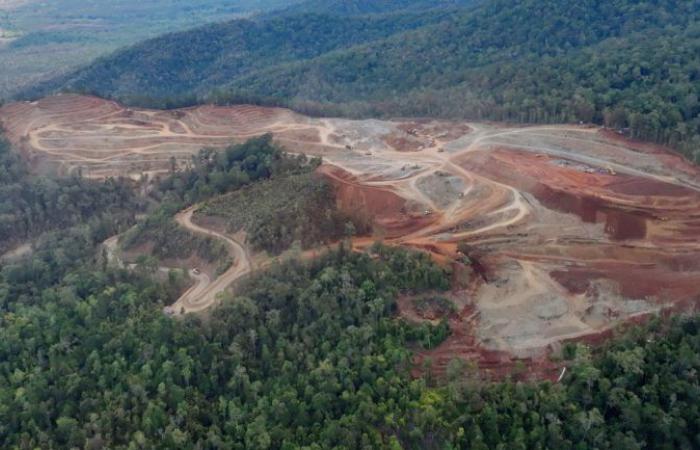
Indigenous people and rural communities in the Philippines face widespread human rights abuses amid rapid expansion of nickel mining, a key component of lithium-ion batteries, Amnesty International writes in a new report released on January 9, 2025, which highlights the human cost of growing global demand for electric vehicles.
Titled What do we get in return? How the Philippines nickel boom harms human rightsthis document highlights the failures to properly consult local populations and obtain the consent of indigenous peoples in the context of nickel mining projects which are synonymous with deforestation, metal contamination and problems of health in the provinces of Zambales and Palawan. It is very likely that the nickel extracted from these sites will enter the supply chains of major electric vehicle manufacturers.
“Indigenous and rural people are paying a heavy price in the global rush for minerals from the energy transition,” said Veronica Cabe, President of Amnesty International Philippines.
“They are consulted through very incomplete processes, biased by misrepresentations and lack of information, and are now forced to suffer the negative effects of these mining operations on their health, livelihoods and access to drinking water. »
Indigenous and rural populations are paying a heavy price in the global rush for energy transition minerals
Veronica Cabe, President of Amnesty International Philippines
The research focused on two areas: the Santa Cruz coastal region of Zambales state and Brooke’s Point, the ancestral homeland of the Palawan indigenous people, on Palawan Island. In Santa Cruz, four major companies currently mine nickel: BenguetCorp Resources Management Corporation, Eramen Minerals Inc., LNL Archipelago Minerals Inc., and Zambales Diversified Metals Corporation. At Brooke’s Point, one company, Ipilan Nickel Corporation (INC), is conducting operations, while two others, MacroAsia Mining Corporation (MMC) and Lebach Mining Corporation, are considering nickel mining projects.
Residents said deforestation and environmental damage from nickel mining were causing them harm. In Santa Cruz, studies suggest that populations are exposed to heavy metal contamination in the air, water and food chain.
In both areas, people interviewed reported an increase in health problems since the mines opened: asthma, coughs, difficulty breathing and other respiratory problems, but also skin diseases and irritations of the eyes, throat and throat. skin. They added that declining water quality – with several freshwater sources turning a “reddish-brown” color – is jeopardizing the livelihoods of fishermen and reducing crop yields.
“The Philippine government must suspend these mining operations until it urgently investigates human rights and environmental abuses, and nickel miners must put human rights at the heart of their actions. their activities,” said Alysha Khambay, researcher in the Corporate Responsibility for Human Rights team at Amnesty International.
“Without greater supply chain transparency, electric vehicle brands will not be able to claim that their products are in no way linked to human rights violations and environmental harm in the Philippines. These brands must verify whether their supply chains have links to nickel mined in the Philippines and make the results and any risk mitigation measures public. »
Conducted between September 2023 and October 2024, the research relied on interviews with 90 community members, as well as site visits and careful review of project documents, court records and images . The responses of the companies, which deny the allegations made against them, can be found in the annex to the report.
Lack of due process and access to information crucial
The report states that indigenous and rural populations have not received adequate explanations of the human rights and environmental risks linked to nickel mining, and have not been duly consulted on mining projects, despite the protections enshrined in national and international law.
-Under these protections, states are required to ensure that residents are meaningfully consulted about extractive projects and, if the project impacts indigenous peoples, must obtain their free consent. , prior and informed. In practice, it is their responsibility to fully inform communities of the potential repercussions of nickel mining, to listen to them and respond to their concerns, to carry out free, prior and informed consent processes, and to respect the results.
In Santa Cruz and Brooke’s Point, residents who depend on their natural environment for their livelihoods said they lack access to crucial information to understand the impact of nickel mining on their communities. Very often, project documents, such as environmental impact studies, have not been presented.
Amnesty International was only able to find relevant environmental impact studies online for three of the seven nickel mining projects mentioned in the report. She requested copies of the studies from other companies and the Philippine Department of Environment and Natural Resources – to no avail.
In some cases, community members specifically requested project documents but were refused, preventing them from making an informed decision. At Brooke’s Point, according to members of the Palawan indigenous people, the Ipilan Nickel Corporation (INC) failed to provide, despite their request, copies of the environmental impact study and the map of operations and of their perimeter.
One of them, Romeo Melnocan of Brooke’s Point, said: “…the map they showed was very blurry. We cannot make a decision based on the information presented because we have not understood the impact. »
According to those interviewed, in both regions, residents known for their opposition to nickel mining were deliberately excluded from the consultations. Those who participated reported being sidelined or ignored when raising concerns about the potential risks of mining projects.
At Brooke’s Point, shortcomings in the free, prior and informed consent processes conducted in relation to the nickel mines of Ipilan Nickel Corporation (INC) and MacroAsia Mining Corporation (MMC) have invalidated these processes and created divisions within the indigenous people of Palawan. However, INC has been mining nickel for more than two years and MMC is close to obtaining the necessary permits to start its commercial mining activities.
Under the free, prior and informed consent process, consent must be given freely, without manipulation, coercion, threats, fear of reprisal or corruption. However, Amnesty spoke to community members who said mining companies INC and MMC had offered them and others bribes to support their projects.
It is time to stop sacrificing the human rights, health and environment of indigenous and rural populations for the benefit of extractive companies, multinational automobile companies and consumers in industrialized countries
Alysha Khambay, researcher in the Corporate Responsibility for Human Rights team at Amnesty International
Community member Beto Calman said: “People are in favor of mining because of the money, the bribes. If there is a meeting, those in favor immediately receive an invitation, but we, the people affected, never receive it. »
According to residents, the free, prior and informed consent processes excluded Palawan customary leaders and all decision-making, which constitutes a violation of the right to self-determination. INC and MMC deny all these allegations and maintain that the processes were carried out as required.
Businesses have a responsibility to conduct due diligence to identify and prevent human rights violations related to their operations or business relationships, and to address adverse impacts where they occur. In situations where the process of free, prior and informed consent is not possible, companies must disengage responsibly, in consultation with affected indigenous populations, and terminate planned operations.
“It is time to stop sacrificing the human rights, health and environment of indigenous and rural people for the benefit of extractive companies, multinational automobile companies and consumers in industrialized countries. There needs to be increased accountability for the electric vehicle and battery supply chain for potential damage caused by mining activities,” said Alysha Khambay.





